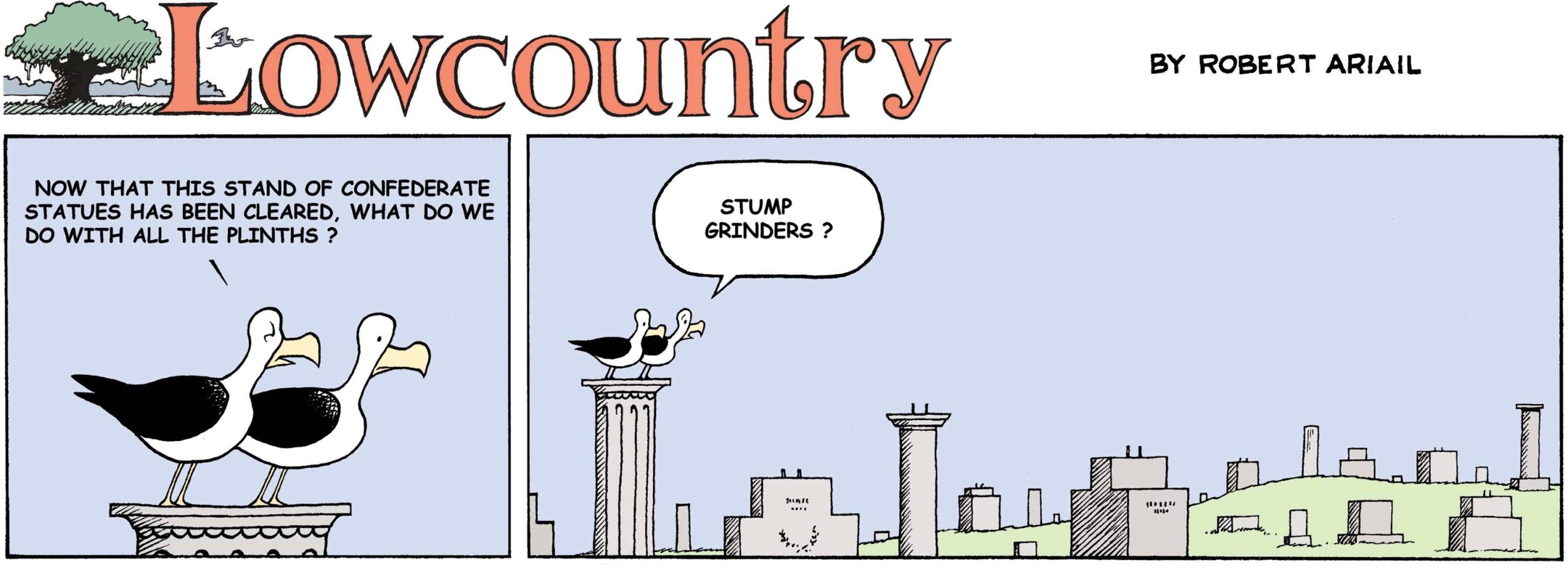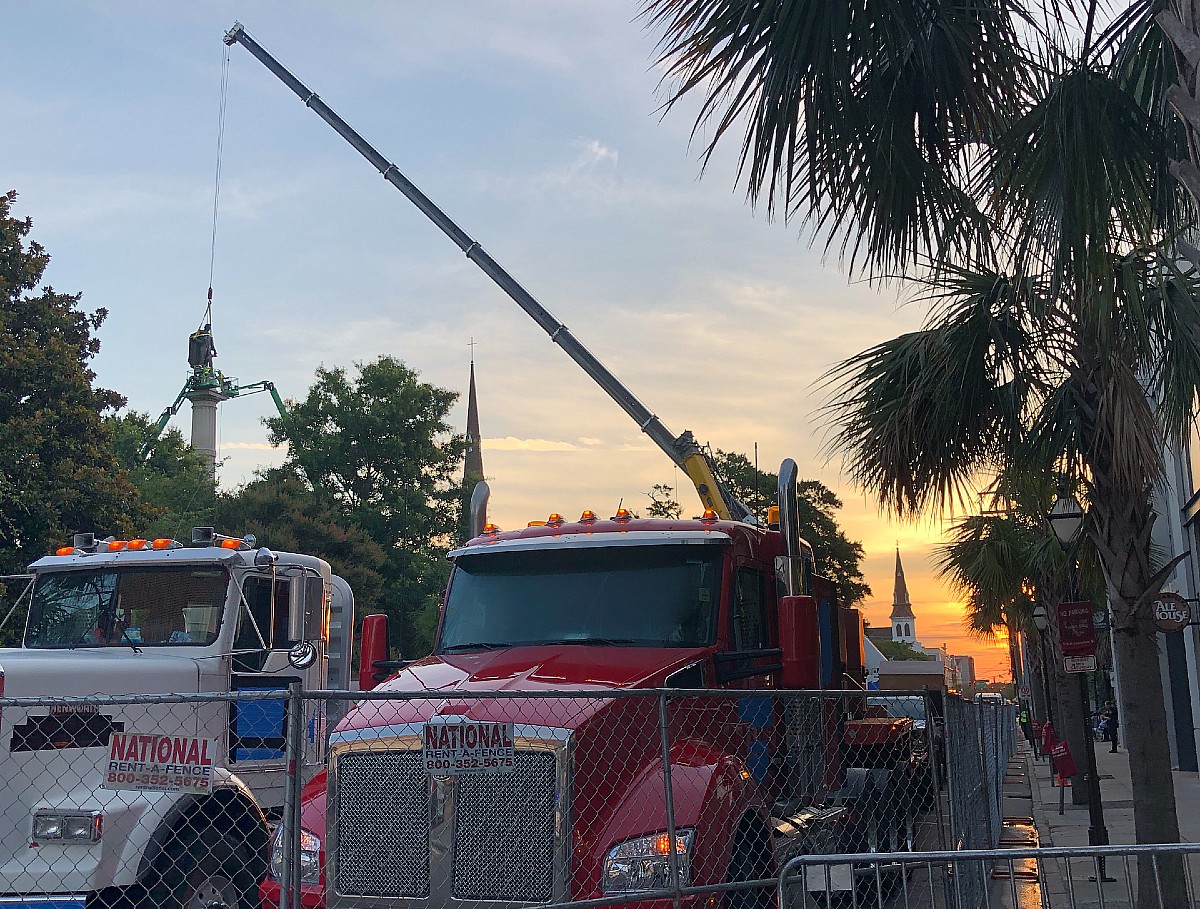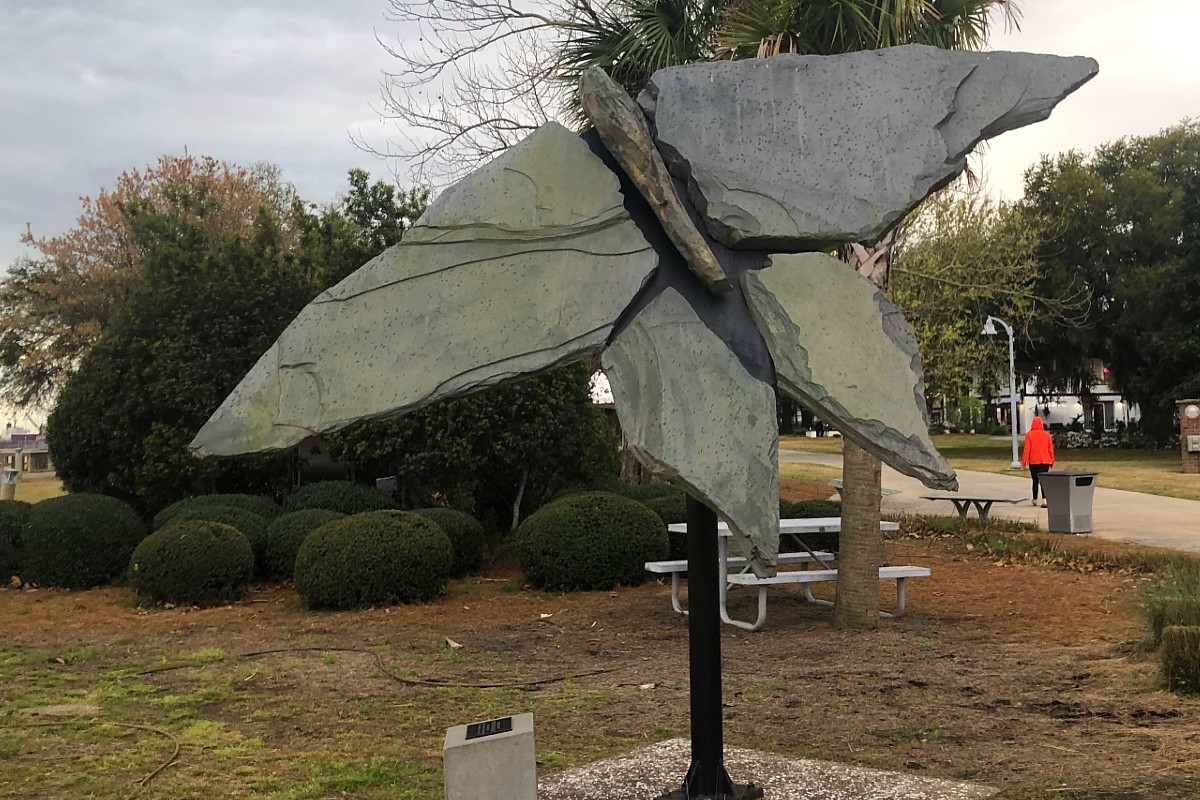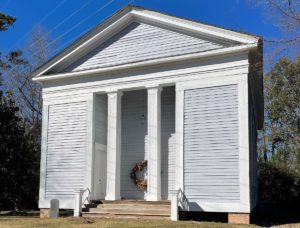STATEHOUSE REPORT | ISSUE 21.12 | MARCH 25, 2022
BIG STORY: Beasley to announce major fundraising push for Ukraine Tuesday
NEWS BRIEFS: Graham takes caustic tone in high court vetting hearing
LOWCOUNTRY, Ariail: Stump grinders
COMMENTARY, Brack: Mostly lackluster election season ahead
SPOTLIGHT: Charleston Animal Society
MY TURN, Probolus: Eliminate Confederate Memorial Day now
FEEDBACK: Send us your thoughts
MYSTERY PHOTO: Big butterfly
Beasley to announce major push for Ukraine Tuesday

By Andy Brack | Former S.C. Gov. David Beasley, head of the world’s biggest food aid agency, will announce a global fundraising drive Tuesday in Columbia as a response to the crisis in Ukraine and a looming worldwide food shortage.
“This is the moment for each individual to push back and play their part in the kind of world they want,” said Beasley, head of the United Nations World Food Program. “We’re seeing extraordinary initiatives emerging from big and small companies, often driven by employee demand. But we’re at the beginning of this crisis, and we need to prepare for the long and hard road ahead.”
Joining Beasley at the 2 p.m. Tuesday news conference on the Statehouse steps will be former S.C. Gov. Jim Hodges and former New York Gov. George Pataki, according to a press release. The initiative will focus on billionaires, corporations and individuals.
Beasley said the new outreach effort is vital to stave increasing operational and food costs because of the war in Ukraine and interruption to its grain production..
“If you think we’ve got hell on earth now, you just get ready,” Beasley told Politico earlier this week. “If we neglect northern Africa, northern Africa’s coming to Europe. If we neglect the Middle East, [the] Middle East is coming to Europe.”
The war, Beasley said, is worsening the problem of global hunger by raising prices and disrupting the supply of food, in part, because Russia and Ukraine traditionally are leading grain producers and exporters. The former governor said European nations needed to pump money to help pay for food aid.
“We’re billions short,” he told Politico. “Failure to provide this year a few extra billion dollars means you’re going to have famine, destabilization and mass migration.” He also added, “What do you think is going to happen in Paris and Chicago and Brussels when there’s not enough food? It’s easy to sit on your high horse in your ivory tower when you’re not the one starving.”
Beasley told Politico that the WFP has an $8 billion shortfall now because of the “perfect storm” of COVID-19, inflation, climate change and wars. In 2021, Ukraine provided 9 percent of the food WFP bought.
- Have a comment? Send to: feedback@statehousereport.com.
Graham takes caustic tone in high court hearing

Staff reports | U.S. Sen. Lindsey Graham, R-S.C., got into a heated exchange Wednesday with U.S. Court of Appeals Judge Ketanji Brown Jackson during her nomination hearing for the U.S. Supreme Court.
Graham focused on the judge’s sentencing record for cases involving images of child sexual abuse. Graham repeatedly interrupted Jackson, the first woman of color to be nominated to the high court.
According to The New York Times, “The flashes of temper were particularly striking coming from a senator who voted less than a year ago to confirm Judge Jackson to the U.S. Court of Appeals for the District of Columbia Circuit. Mr. Graham’s aggressive questioning of Judge Jackson over the past two days — which has included rapid-fire rhetorical questions, frequent interruptions and some lengthy, fiery lectures — suggested that he was unlikely to back her for the nation’s highest court.”
Graham also made it clear that he was unhappy that President Biden nominated Jackson over U.S. District Judge Michelle Childs of South Carolina. More: Spartanburg Herald-Journal.
In other recent news:
![]() S.C. Senate mulls transgender athlete ban. A bill requiring public high school and college athletes to compete with the gender listed on their birth certificates was sent Wednesday to the Senate floor. More: WBTW
S.C. Senate mulls transgender athlete ban. A bill requiring public high school and college athletes to compete with the gender listed on their birth certificates was sent Wednesday to the Senate floor. More: WBTW
S.C. Ethics Commission stops silencing whistleblowers after lawsuit.
S.C. Ethics Commission leaders said the agency will no longer silence whistleblowers who file complaints accusing South Carolina public officials of misconduct.
S.C. Senate debates private school choice for poorer students. The S.C. Senate’s debate on a bill that would give some students money so they could pick a private school or public school outside their district will continue into next week. More: WCSC TV
S.C. residents lost $42M to cyber crime in 2021, FBI says. More than 5,000 South Carolina residents lost around $42.7 million to cyber crime last year, according to a new FBI report. More: WSPA TV
S.C. agency targeted for failing to stop slime-killing chemical in drinking water. The S.C. Department of Health and Environmental Control, which is charged with protecting state drinking water supplies, allowed the city of Denmark to use an unauthorized chemical in its drinking water, exposing residents for a decade.
Charleston ports needs more money to build rail yard, agency says. The State Ports Authority said delays in construction of a rail yard serving its container terminals will drive up costs.
Dominion Energy seeks rate increases. Dominion Energy is seeking a rate hike for S.C. customers after an annual review of costs of transportation and buying fuel found around $142 million under-collected in fuel costs.
- Want more headlines every business day that are like this? Visit our friends at SC Clips.
Stump grinders

Cartoonist Robert Ariail often interprets things a little differently, but always has an interesting take on what’s going on in South Carolina. Love the cartoon? Hate it? What do you think: feedback@statehousereport.com.
Mostly lackluster election season ahead

By Andy Brack | Election season used to be kind of fun but in recent years, it’s just become kind of mean.
Now is the time of year that election season is, as the Australians say, “hotting up,” but quite frankly, the temperature is pretty tepid. Candidates have a few days left to file before the June 14 partisan primaries, but the only word to describe what’s going on is “lackluster.”
On the Republican side, Gov. Henry McMaster is running for reelection and mostly has a downhill battle. We didn’t even realize he had what seems to be token primary opposition until a search of opponents who have filed. (If you’re keeping score, it looks like the conservative McMaster, like many GOP incumbents, is predictably getting challenged from the right as the state’s primary process has evolved into rage politics at the edge, not middle, thanks to rampant redistricting by the legislature.)

McMaster, 74, filed on March 16, saying, “When we work together to advance our shared conservative values, we can achieve great things. South Carolina is in the best financial shape ever, and we are excited to build upon that success by cutting taxes. For South Carolina, the best is yet to come.”
Not so fast, say the two Democrats who have filed to replace McMaster in what may be one of two statewide elections with a pulse by the time the general election rolls around in November.

Former Democratic U.S. Rep. Joe Cunningham of Charleston filed this week, saying he wanted to bring the Palmetto State into the future in a statement to the Charleston City Paper: “Under a Cunningham administration, we will finally tackle the most pressing challenges facing our state that Columbia politicians and Henry McMaster have ignored for decades,” he said. “We will raise teacher pay and improve our schools, protect voting rights, end corruption at the Statehouse, fix our crumbling roads, legalize marijuana and make health care affordable and accessible to all.
“If Henry McMaster couldn’t fix these problems throughout his 40-year career in politics, he won’t fix them with another four. It’s time for new ideas and a new vision and I’m ready to help South Carolina reach its full potential.”

Mia McLeod, a state senator from Richland County, sent this message after she filed in the Democratic primary: “We have the power to transform South Carolina into a state where generation after generation can thrive,” she said. “A South Carolina where a person’s future is brighter than their present, where young people want to stay and raise a family, and where we are all cared for, educated, and treated with dignity.”
McMaster likely will cruise to the Republican nomination, while Cunningham and McLeod will use up precious financial resources to distinguish themselves in the June Democratic primary, which probably won’t get much voter traction because there aren’t that many contests to attract the attention of Democratic voters.
Republicans have more contested races, the largest of which will see several candidates battle to be the candidate to be state superintendent of education. Incumbent Molly Spearman isn’t running for re-election. Other higher-profile elections that will attract independents and Democrats to vote in the GOP primary include:
U.S. House, District 1: Incumbent Nancy Mace, who is expected to file by March 30, faces former state Rep. Katie Arrington, who lost to Cunningham in 2018, and newcomer Lynz Piper-Loomis. This will be a barnburner as Mace, a former staffer for former President Donald Trump, is running without his endorsement, which Arrington has.
U.S. House, District 4: Incumbent William Timmons faces three GOP challengers.
U.S. House, District 7: Incumbent Tom Rice, who outraged Trump supporters by voting with Democrats to impeach Trump, faces four GOP challengers.
On the Democratic side, veteran U.S. Rep. Jim Clyburn (SC-6), the third-ranking member of his party in the U.S. House, faces two primary challengers who are mostly unknown.
Hold onto your hats, but don’t worry: It’s not that windy this election season.
Andy Brack is publisher of the Charleston City Paper and editor and publisher of Statehouse Report. Have a comment? Send to: feedback@statehousereport.com.
Charleston Animal Society
 We’re pleased today to shine our spotlight on the Charleston Animal Society, leader in the effort to make Charleston County a safe place for animals. Now the society is working to expand its Charleston success statewide to energize the state to reshape its 300-plus shelters and animal organizations into a no-kill network that stretches from Walhalla to Little River to Daufuskie Island.
We’re pleased today to shine our spotlight on the Charleston Animal Society, leader in the effort to make Charleston County a safe place for animals. Now the society is working to expand its Charleston success statewide to energize the state to reshape its 300-plus shelters and animal organizations into a no-kill network that stretches from Walhalla to Little River to Daufuskie Island.
Safe and healthy communities, neighborhoods and families don’t just happen – they’re built. “No Kill – No Harm – No More” shines a spotlight on animal abuse and family violence, which are often perceived and treated as separate issues. However, animal abuse is often the tip of the iceberg to larger issues in the home, such as child abuse, elder abuse or domestic violence.
- South Carolina’s most honored charity four years in a row
- National model for success
- Southeast’s only AAHA-accredited combined clinic and shelter
- Focused on solving problems rather than reacting to them year after year
- Publishes Carolina Tails, the largest pet magazine in S.C.
- No Kill. No Harm. No More. is a “movement” comprised of two major initiatives: No Kill Charleston and No Kill South Carolina.
- Learn more about the Charleston Animal Society and its work to create a network of humane network for the animals that bring joy to our lives.
Eliminate Confederate Memorial Day now

By Kimberly Probolus, exclusive | After nine Black worshippers at Emanuel AME Church in Charleston were murdered by a white supremacist gunman who had previously been photographed with Confederate iconography in 2015, South Carolina swiftly removed the Confederate battle flag from the Statehouse grounds. When then-Gov. Nikki Haley explained the decision, she acknowledged that the flag should never have been raised there and described her realization that “people were driving by and felt hurt and pain.”
Today, South Carolina is taking another step in the right direction by recognizing the hurt and pain that the Confederate Memorial State Holiday causes. In a remarkable unanimous vote by the South Carolina Senate, 29 Republicans and 16 Democrats elected to create a floating holiday that would allow state workers to choose when to take time off.
It is noteworthy that the bill’s original intent was to make the Juneteenth federal holiday — which honors the day that formerly enslaved people in Texas learned they were free — a state holiday. Instead, lawmakers decided to eliminate Confederate Memorial Day entirely. The vote is now headed to the S.C. House of Representatives, where elected officials have the power to stop commemorating the May 10 death of Confederate General Stonewall Jackson once and for all.
If passed, Confederate Memorial Day would only be the second memorial removed from the state since the Charleston church massacre — leaving 224 Confederate symbols remaining. Even after the Unite the Right Rally [in Virginia] in 2017 resulted in the death of anti-racist protestor Heather Heyer, South Carolina did not remove any memorials. George Floyd’s 2020 murder sparked the relocation, removal and renaming of 157 memorials — but none of them were in South Carolina. That same year, four schools in Lee County attempted to change their name and take part in a national reckoning over the legacy of slavery. Two years later, changes have not yet been made and renames are still pending.
Preservation laws help to explain why progress has been nonexistent in the state. The 1976 law prohibits monuments or memorials on public property from being “relocated, removed, disturbed, or altered.” What’s more, the law refers to the Civil War as the “War Between the States,” a historically inaccurate term that reinforces the Lost Cause myth and the erroneous belief that the Civil War was fought over slavery, not states’ rights. The law prohibits communities from deciding who and what they want to honor in public space.
Clearly, there is still work to be done. First, South Carolina must lobby to repeal the outdated and draconian preservation law. It is impossible for communities to challenge the racist memorials in their presence when there are laws on the books protecting them. Contact your state representative and tell them that you want communities to have the power to create commemorative landscapes in ways that reflect their values.
Second, use the Whose Heritage? map and database to research whether there’s a Confederate memorial in your community. Contact us if there is a Confederate memorial that’s missing from our data.
Third, refer to SPLC’s Community Action Guide. The text not only provides resources and strategies for identifying and removing Confederate symbols, it also offers advice on the social justice movement and coalition building.
Finally, teach the history of the Civil War honestly and accurately. Learning for Justice’s Teaching Hard History framework provides resources for educators looking to inform students about the legacy of slavery in the United States.
At the SPLC we know that removing Confederate Memorial Day cannot and will not bring back Clementa C. Pinckney, Cynthia Graham Hurd, Susie Jackson, Ethel Lee Lance, Depayne Middleton-Doctor, Tywanza Sanders, Daniel L. Simmons, Sharonda Coleman-Singleton and Myra Thompson. Nor can it erase the legacy of slavery.
However, South Carolina cannot and will not live up to its stated democratic ideals until all Confederate memorials are removed. In the words of [South Carolina] poet Nikky Finney, “Our one and only Civil War is done. /Let us tilt, rotate, strut on. If we,/The living, do not give our future/The same honor as the sacred dead,/Of then and now – we lose everything.”
By passing this law, South Carolina will honor its future and the lives lost in the Charleston church massacre, looking forward to a time when the state’s monuments and memorials truly reflect the state’s values.
Kimberly Probolus is a senior research analyst with the Southern Poverty Law Center’s Intelligence Project, where she researches the history of Confederate monuments and contributes to the “Whose Heritage?” report on public symbols of the Confederacy.
Send us your thoughts
We receive a few comments a week and look forward to publishing. But often we can’t because we can’t verify the identity of the writer. To be published, you’ve got to provide us with contact information so we can verify your letters. Verified letters to the editor are published weekly. We reserve the right to edit for length and clarity. Comments are limited to 250 words or less. Please include your name and contact information.
- Send your letters or comments to: feedback@statehousereport.com
Big butterfly

Here’s a big butterfly made out of blue granite, the state’s stone. Where is it? Send your guess to feedback@statehousereport.com — and remember to include your name, home city and contact information.
 Last week’s mystery, “Old church,” shows a photo of Swift Creek Baptist Church in the Boykin community near Rembert. Thanks to Barry Wingard of Florence for sending the photo.
Last week’s mystery, “Old church,” shows a photo of Swift Creek Baptist Church in the Boykin community near Rembert. Thanks to Barry Wingard of Florence for sending the photo.
Congrats to these keen detectives for identifying the photo: Jay Altman and Yarley Steedly, both of Columbia; Robert Ariail and Katharine Beard, both of Camden; George Graf of Palmyra, Va.; Elizabeth Jones of Columbia; Christine Simonson of Sumter; Allan Peel of San Antonio, Texas; Bill Segars of Hartsville; Pat Keadle of Wagener; and David Lupo of Mount Pleasant.
Segars tells us that “since this church currently has no members and very few written records remain concerning this congregation, there is a fair amount of confusion about the exact year of its establishment. Nonetheless it is a very nice building, which is well maintained by interested local people that love it.”
But Graf said, “The Swift Creek Baptist Church, founded in 1787 with 55 members, was built on an acre of land donated by the Boykin family. Slave galleries were built in this historic church and there is a slave graveyard behind it. The church has changed its name several times and has been used by both the Baptists and the Methodists. In the early 1930s, it was abandoned for 60 years. In 1994 the church was refurbished and restored, producing a beautiful old structure.”
- Send us a mystery. If you have a photo that you believe will stump readers, send it along (but make sure to tell us what it is because it may stump us too!) Send to: feedback@statehousereport.com and mark it as a photo submission. Thanks.
- ORDER NOW: Copies are in Lowcountry-area bookstores now, but if you can’t swing by, you can order a copy online today.
- Now available as an e-book!
ABOUT STATEHOUSE REPORT
Statehouse Report, founded in 2001 as a weekly legislative forecast that informs readers about what is going to happen in South Carolina politics and policy, is provided to you at no charge every Friday.
- Editor and publisher: Andy Brack, 843.670.3996
Donate today
We’re proud to offer Statehouse Report for free. For more than a dozen years, we’ve been the go-to place for insightful independent policy and political news and views in the Palmetto State. And we love it as much as you do.
But now, we can use your help. If you’ve been thinking of contributing to Statehouse Report over the years, now would be a great time to contribute as we deal with the crisis. In advance, thank you.
Buy the book
Now you can get a copy of editor and publisher Andy Brack’s We Can Do Better, South Carolina! ($14.99) as a paperback or as a Kindle book ($7.99). . The book of essays offers incisive commentaries by editor and publisher Andy Brack on the American South, the common good, vexing problems for the Palmetto State and interesting South Carolina leaders.
More
- Mailing address: Send inquiries by mail to: P.O. Box 21942, Charleston, SC 29413
- Subscriptions are free: Click to subscribe.
- We hope you’ll keep receiving the great news and information from Statehouse Report, but if you need to unsubscribe, go to the bottom of the weekly email issue and follow the instructions.
- Read our sister publication: Charleston City Paper (every Wednesday in print; Every day online)
- © 2022, Statehouse Report, a publication of City Paper Publishing, LLC. All rights reserved.
















 We Can Do Better, South Carolina!
We Can Do Better, South Carolina!
Pingback: Beasley’s Ukraine push; Elections; Confederate Memorial Day – Statehouse Report - PublicFigure
Pingback: NEW for 3/25: Beasley’s Ukraine push; Elections; Confederate Memorial Day – Statehouse Report – Statehouse Report – Fractal Flowers